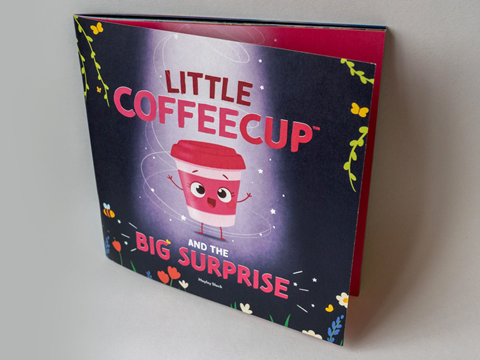
Little Coffee Cup and the Big Surprise by Hayley Slack claims to be the ‘world’s first’ published children’s book to be printed on paper made from recycled coffee cups, using James Cropper’s CupCycling process.
The story introduces young readers to Little Coffee Cup, a character who leaves the comfort of a café to discover the world outside – but the book also hopes to spark conversations about waste, reuse and the circular economy.
Each physical book is made from 13 recycled coffee cups, collected from across the UK. Through the CupCycling process, the cups are transformed into high-quality paper at James Cropper’s Burneside Mill in the Lake District. The book ends at the same mill where the real cup-to-book transformation takes place.
The book’s release follows the UK government’s decision to scrap a proposed mandatory takeback scheme for disposable cups, citing limited environmental benefit and high cost to industry.
James Cropper cites data from environmental action NGO WRAP which estimates that 3.2 billion single-use cups are used annually in the UK. It adds that sufficient processing capacity already exists to recycle this volume of cups, suggesting that the key barrier lies in collection and participation.
“I wanted to show that we can create children’s books using UK waste, supporting both the environment and local industry,” author Hayley Slack explains. “If we can demonstrate how recycled coffee cup waste can become new books we can promote greater rates of recycling, less imports and reduce the number of trees being used solely for new books.”
Last year James Cropper launched its premium garment tags made from recycled coffee cups for New Zealand lifestyle brand Untouched World. The tags are reportedly 100% recycled, consisting of 20% post-consumer denim fibre and 80% recycled fibre from sources such as coffee cups.
More recently, paper cups from McDonald’s, Greggs, Pret a Manger, Costa Coffee, and Caffè Nero can now be recycled via a ‘world-first’ AI-based recycling trial run in Cardiff by the National Cup Recycling Scheme, Keep Wales Tidy, and Bower. Bower’s cup analysis technology uses photographic detection, requiring consumers to download its app and scan their returns for a 5p reward per cup.
If you liked this story, you might also enjoy:
The ultimate guide to the Packaging and Packaging Waste Regulation in 2025
How are the top brands progressing on packaging sustainability?
Everything you need to know about global packaging sustainability regulation in 2025
The key to increasing the use of reusable packaging in supermarkets














No comments yet